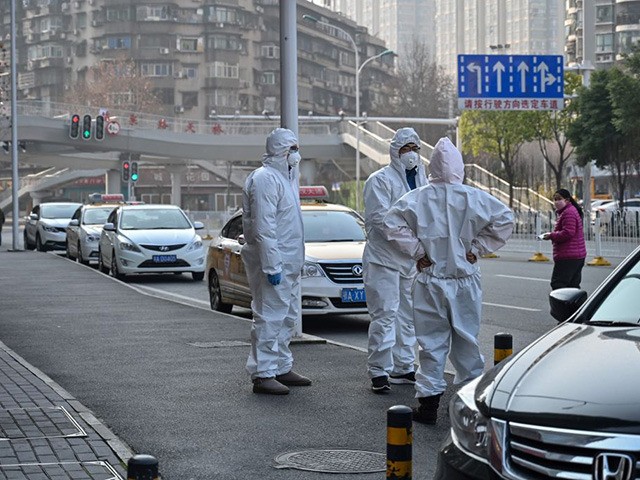The official number of people dead after contracting the newly discovered Chinese coronavirus surpassed 1,000 on Tuesday, bolstered by the deaths of over 100 people in the 24-hour window, the largest number yet recorded.
All but two of the 1,018 deaths on record occurred within China; one resident of Wuhan, China, died in the Philippines, while another patient died in Hong Kong. The overwhelming majority of the 43,138 cases of confirmed coronavirus infection have occurred in China. Hubei, the province for which Wuhan serves as capital, has documented most of the cases.
Chinese authorities confirmed the deaths of 108 people on Tuesday for the 24-hour window prior to their announcement, the largest number in one day and the first time that authorities have tallied more than 100 deaths in that timeframe. Hubei province accounted for 103 of those deaths.
China also claims that 4,294 people have completely recovered from the virus-related infection. In an attempt to claim that the outbreak was controllable, China’s Center for Disease Control claimed that upwards of 80 percent of known infections occurred among members of families, suggesting that taking precautions in public should curb the spread of the disease significantly. Authorities also claimed that over 80 percent of infections either occurred in Hubei or involved people who had been to Hubei, suggesting minimal viral transmission away from the epicenter of the outbreak.
The novel coronavirus, whose existence scientists had not documented before Beijing revealed it had identified it on January 20, is believed to have originated at a wild meat market in Wuhan, a city of 11 million people. Local authorities shut the market down on January 1 after alerting the World Health Organization (WHO) to the outbreak but did not tell the public until January 20, allowing for high-risk community activities like an attempt to break the record for world’s largest banquet. Medical authorities were also kept in the dark, resulting in highly contagious patients not being isolated at hospitals, exposing already delicate, hospitalized patients to the virus.
The novel coronavirus causes fever, difficulty breathing, and other flu-like symptoms. In sensitive patients, it can lead to pneumonia and death.
At least one known patient, however, was a young, healthy adult: Li Wenliang, a Wuhan doctor detained and humiliated by Communist Party authorities for warning fellow doctors that he believed the virus was contagious. Li did so before authorities had announced the outbreak to the public, thus, according to police, “severely disturbing public order.” The doctor, 34, died last week, allegedly after contracting the virus.
The record-breaking number of deaths calls into question adamant assurances from Chinese state media in January that the outbreak had already begun to wane and the number of cases begun to fall. The Global Times insisted in late January, citing one decline in the number of documented cases over a 24-hour period in which Chinese officials admitted to not having enough testing kits, that a “gleam of hope” had arrived and infections were becoming less common. The Global Times manipulated the numbers by including cases in Taiwan, a sovereign state with no ties to Beijing, and the autonomous provinces of Hong Kong and Macau, where authorities have done a much more efficient job of containing the outbreak.
China’s response to the outbreak has been largely containment of individuals. Wuhan and its suburbs, also major cities in population size, have gone on total lockdown, limiting travel and canceling public transportation. Reports indicate that suspected patients are being forced into mass quarantine camps in the city. Unverified video and personal testimonies also indicate that police are welding and bolting shut the doors on residential homes, locking people inside suspected of carrying the virus. Multiple reports, including anonymous testimony from doctors, also suggest that hospitals are deliberately failing to test individuals with coronavirus symptoms, artificially deflating the number of confirmed cases.
Chinese authorities again attempted to appear in control of the situation on Tuesday, announcing the creation of a new “task force” in Hubei to organizing virus response. The task force appears to be focusing on evaluating and purging local officials considered insufficiently loyal to Beijing or incompetent. By mid-Tuesday local time, Hubei’s top health officials – Communist Party health commission boss Zhang Jin and non-Party director Liu Yingzi – had been fired.
Aiding the Communist Party is a team of WHO experts deployed to China featuring the top officials responsible for the lamentable WHO response to the 2014-2016 Ebola outbreak in West Africa, which killed over 11,000 people. WHO Secretary-General Tedros Adhanom Ghebreyesus warned on Monday that the biggest concern for the agency now is cases transmitted among individuals who had never been in Hubei province – despite the fact that Beijing confirmed the overwhelming number of cases involved people in or with a past travel history of being in Hubei.
“The detection of this small number of cases could be the spark that becomes a bigger fire, but for now it’s only a spark,” Tedros said. “Our objective remains containment. We call on all countries to use the window of opportunity we have to prevent a bigger fire.”
Tedros has insisted that he has full confidence in the Chinese Communist Party to contain the outbreak.
“Although the numbers outside China are still relatively small, they hold the potential for a much larger outbreak,” he said in January. “For that, China deserves our gratitude and respect … China is implementing very serious measures and we cannot ask for more.”
The WHO has excluded Taiwan from international coronavirus response despite its proximity to China at China’s request, resulting in the United Nations agency publishing false information on the number of cases of coronavirus on the island. Taipei has repeatedly condemned its exclusion, noting that it is a developed country with a democracy and advanced healthcare system that could play a major role in saving lives.

COMMENTS
Please let us know if you're having issues with commenting.